Explore web search results related to this domain and discover relevant information.

Kvothe is the titular main protagonist of The Kingkiller Chronicle by Patrick Rothfuss. He is a legendary former hero that has since fallen from grace and works as an innkeeper in a small village. Kvothe is famous for his red hair that looks like flame. He has green eyes that are said to change ...
Kvothe is the titular main protagonist of The Kingkiller Chronicle by Patrick Rothfuss. He is a legendary former hero that has since fallen from grace and works as an innkeeper in a small village. Kvothe is famous for his red hair that looks like flame. He has green eyes that are said to change color.Kvothe was raised among the Edema Ruh, which is a group of traveling performers and musicians. It is there that he picked up his love of music and learned to play the Lute. His troupe was led by his father Arliden the Bard and his mother Laurian. One day while traveling they met a traveling Arcanist named Abenthy.Abenthy joined their troupe and started to Tutor Kvothe. He quickly realized that Kvothe was a genius and taught him many advanced subjects such as science, rhetoric, and Sympathy (a form of magic that conforms to scientic laws). Eventually, Abenthy left the troupe and gave Kvothe a book with a message and his signature.Shortly after Abenthy left, Kvothe left the troupe for a few hours to gather firewood. When he came back, he saw that his entire troupe was killed by a dark group known as the Chandrian, an ancient and feared group which mst believed didn't exist. Kvothe was taunted by Cinder, who claimed he killed them for singing songs about the Chandrian.
Illustrated by Marc Simonetti During our annual reread of The Name of the Wind, David had the lovely idea that we should collaborate on a defense of Kvothe. ...
If you have read the Kingkiller Chronicle or even just the first book, The Name of the Wind by Patrick Rothfuss, you probably know that the main character Kvothe can be a very divisive character. So much so that we would say that most people who do not like him end up not liking the story either or even hating it/him.We like to think that we fall into the middle category where we really love his character, but can understand where people are coming from when they say they are not a fan. The goal for this post is not to make you change your mind about Kvothe if you dislike him, but to candidly discuss what we think makes him a great character despite his flaws.In order to do that we’re going to take two of the more common things that people say they dislike about Kvothe’s character and dissect them by going through the story and using specific examples to make these arguments.A lot of people look at Kvothe and see that he’s naturally gifted in many areas and view that as unrealistic. People go so far as to call him a Gary Stu; someone unrealistically free of weakness. People tend to forget that the essence of this novel revolves around myths, legends, and folklore.
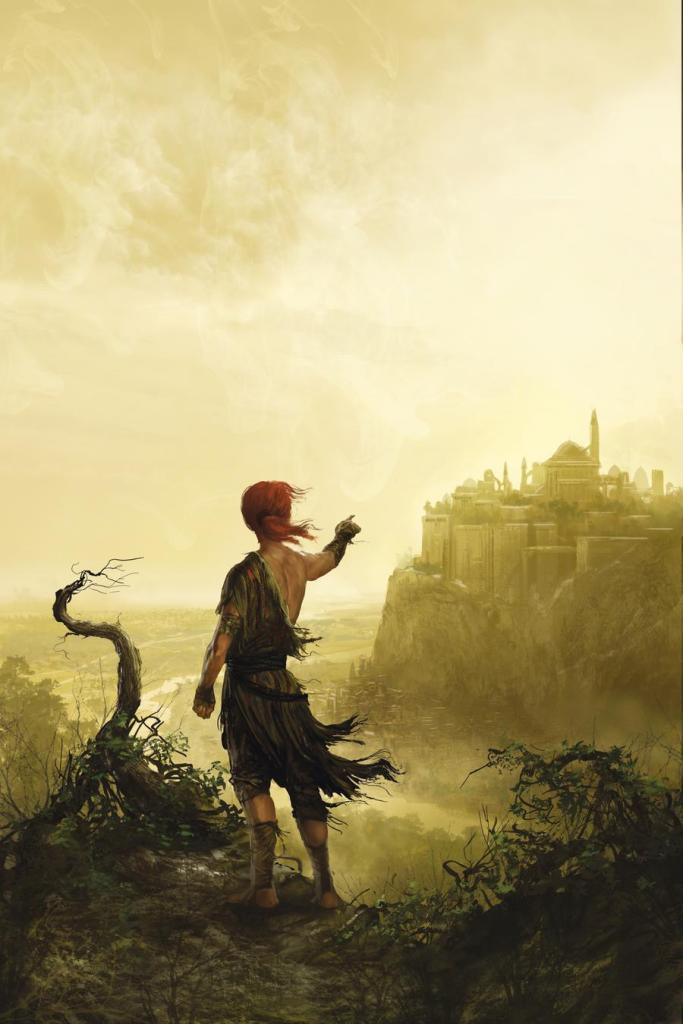
The series centers on a man named Kvothe, an infamous adventurer and musician telling his life story to a scribe. The book is told in a "story-within-a-story" format: a frame narrative relates the present day in which Kvothe runs an inn under an assumed name and is told in omniscient third person.
In 2017, Rothfuss said that his editor and publisher Betsy Wollheim hadn't liked his proposed title, The Doors of Stone, for the third novel, but that it had "by popular consensus" become the "de facto title", after which she accepted it. The Doors of Stone is unreleased as of 2025, a point of contention online. Rothfuss has said that the book would "conclude Kvothe's story", closing off the current arc, but that further stories in the world of Temerant would be forthcoming.The main plot, making up the majority of the books and concerning the actual details of Kvothe's life, is told in the first person.The Kingkiller Chronicle tells the life story of a man named Kvothe. In the present day, Kvothe is a rural innkeeper, living under a pseudonym.The Kingkiller Chronicle is a planned fantasy trilogy by the American writer Patrick Rothfuss. The first two books, The Name of the Wind and The Wise Man's Fear, were released in 2007 and 2011. The books released in the series have sold over 10 million copies.


Timothée Chalamet, Margaret Qualley, Sofia Wylie, Wesley Snipes, Benedict Cumberbatch, and so many more...Dip in to find out who they’d play in Patrick Rothfuss’ epic tale of Kvothe the Kingkiller.
Whether he's getting banned from the Archives, having sex with fairy gods, or making us wait a billion years to see what happens in the third book of his story, Kvothe is always on his grind. You might argue that I’m conflating Patrick Rothfuss, the author of The Kingkiller Chronicle, with his lead character.But he’s not. In The Name of the Wind and The Wise Man’s Fear, the first two books in Rothfuss' trilogy, Kvothe appears to be at once witless and genius, tactless and adaptable, weak and powerful, impotent and controlling. It’s one thing to have to figure out how a story featuring such a challenging protagonist will end; that’s Rothfuss’ job.Although this present-day Kvothe is canonically in his mid-20s, some age-distortion is likely going on thanks to his time in the fae realm, and it’s a good bet that Hollywood would try to age him up to exaggerate his beaten-ness, as famously described by Rothfuss himself: this Kvothe is nothing more than “a man who is waiting to die.”That’s why Gordon-Levitt would make sense for this role. At 43 years old, he’s taken on more of a grizzled demeanor than what he was known for in his younger days, but he still has a sprightliness about him that could hint at the Kvothe from the stories.
309 votes, 66 comments. I know the knee-jerk reflex is to hate the idea that Kvothe's story is a lie but look how well this all fits together. It's…
Kvothe is acting, even to Bast. Kvothe has to put on a flawless masterpiece of a performance, because his enemies can hear every word... just like the reader can. Kvothe is indisputably hiding information on purpose... this seems self-explanatory, but if there is a big twist, and we know there is at least one big twist, Kvothe is keeping it untold until the end.The dragon, the trial, the shipwreck, the fake troupe, all of Denna's weird shit... I don't think Rothfuss is bending the truth here by hiding behind "oh well the character lied, Kvothe was just quoting Skarpi. Kvothe wasn't lying, Skarpi was". I think Rothfuss is saying the whole story is one lie, because you have to be a liar to tell a story the right way.He thinks that the story is Arliden's song / Lanre's Name. I also think that Kvothe's story is Lanre's Name, but I think that Lanre cultivated a Terrible Name, three names together. When he returned to Selitos, Lanre was "Aleph, Iax, and Lyra", he was three friends together.This subreddit is dedicated to everything related to The Kingkiller Chronicle, a fantasy trilogy by Patrick Rothfuss, telling the biography of "Kvothe", an adventurer, arcanist and musician.

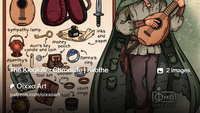
I was really surprised that so many folks really liked my Kvothe DnD fanart and his inventory from "Kingkiller Chronicle" by Patrick Rothfuss, so I've decided to make an extra pack for those of you, who'd like to use them in your adventures!
My name is Kvothe, pronounced nearly the same as quothe. Names are important as they tell you a great deal about a person. I've had more names than any...
Patrick Rothfuss — ‘My name is Kvothe, pronounced nearly the same as quothe. Names are important as they tell you a great deal about a person. I've had...

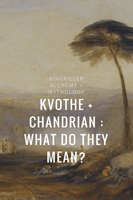
Kvothe — what does the name mean? And what about Chandrian? The word “quoth” is the simple bast tense of “quethe,” which means “said.” To say. To speak. It—
The reason I don’t care about spoilers is precisely because grass still surprises me even after all these years. So does rain. So does the Name of the Wind. Before we get into the name Kvothe, I want to make a note about criticism — what makes a good one and what makes a bad one.The credit belongs to the man who is actually in the arena, whose face is marred by dust and sweat and blood; who strives valiantly; who errs, who comes short again and again, because there is no effort without error and shortcoming; but who does actually strive to do the deeds; who knows great enthusiasms, the great devotions; who spends himself in a worthy cause; who at the best knows in the end the triumph of high achievement, and who at the worst, if he fails, at least fails while daring greatly, so that his place shall never be with those cold and timid souls who neither know victory nor defeat.Meanwhile, Lin-Manuel Miranda has taken on the role of something our culture has not had in a long, long time: the bard. Bards were once equal with kings, you know. Bards had a role both in the making of culture and in the preservation of culture through being good judges.King, judge, executioner. And in the case of the bard: writer, singer, critic. To have a critic whose only job is to pass judgement is quite like having a king who will not even attend an execution. Rothfuss sets a good example of showing precisely how and why he thinks the way he does about various books, curating a recommendation list with everything he reads.
I am wondering why Kvothe the Innkeeper is so weak. I assume everything will be explained in the 3rd book, but that appears to be scheduled for release too far in the future, so I am looking for an...
While the third book will hopefully shed even more light on this, we get an explanation from Bast at the end of The Name of the Wind. Essentially, Kvothe is so weak because he's been playing the role of an Innkeeper for so long, he's forgotten that it was a role, and therefore it is becoming reality.When using sympathy, an arcanist splits off a part of his mind to contain the utter belief in the binding. The stronger the belief that the binding works, the stronger the binding. It is repeatedly mentioned how unusually strong Kvothe's ability with his Alar is, and how effortless he makes complex applications of Alar seem.If Bast's explanation that Kvothe's change in self-perception is responsible for Kote being "a thin shadow of a man" is correct, it seems reasonable that Kvothe's particular talents for using his belief to manipulate reality may be working against him, making this more of a dramatic and fundamental change than it might be for a lesser man.In the first chapter (again text not on hand) we are told Kote had chosen his new name carefully, as names are important, suggesting that Kvothe has 'become' Kote, rather than just disguising himself in a role, like an actor would, that Kvothe no longer exists, and so his powers are no more.

Kvothe — what does the name mean? And what about Chandrian? The word “quoth” is the simple bast tense of “quethe,” which means “said.” To say. To speak. It—
The reason I don’t care about spoilers is precisely because grass still surprises me even after all these years. So does rain. So does the Name of the Wind. Before we get into the name Kvothe, I want to make a note about criticism — what makes a good one and what makes a bad one.Let’s start with the assumption not only that names mean a lot, but that with this many names we likely have both the meaning and outline of the series in embryo right here. This page is all we need to check the whole Felling and man waiting to die assumptions. That said, what about Kvothe?Cweþan came from the proto-germanic kweþaną from which is derived the the Old Norse word “kveða” and from it the Faroese word “kvøða” emerged, which is pronounced very similarly to “Kvothe,” only the closed-mid front rounded vowel is hard for most modern English speakers unless they see something really gross on the New York City subway.The priest-king was a chandrian — a singer-maker and the demon of death (or silence or winter’s pale). Kvothe has now become the nightmare, the god of death (or silence or sun or winter) who must be sacrificed. He has stored his death (or life or soul) in a lockless box or mistletoe or something similar involving a special type of wood (potentially roah).

83 quotes have been tagged as kvothe: Patrick Rothfuss: ‘It's the questions we can't answer that teach us the most. They teach us how to think. If you gi...
My first mentor called me E'lir because I was clever and I knew it. My first real lover called me Dulator because she liked the sound of it. I have been called Shadicar, Lightfinger, and Six-String. I have been called Kvothe the Bloodless, Kvothe the Arcane, and Kvothe Kingkiller.I have earned those names. Bought and paid for them. But I was brought up as Kvothe. My father once told me it meant "to know." I have, of course, been called many other things. Most of them uncouth, although very few were unearned. I have stolen princesses back from sleeping barrow kings.“My name is Kvothe, pronounced nearly the same as "quothe." Names are important as they tell you a great deal about a person. I've had more names than anyone has a right to. The Adem call me Maedre. Which, depending on how it's spoken, can mean The Flame, The Thunder, or The Broken Tree.“After an awkward pause, Bast extended his hand. Chronicler hesitated for a bare moment before reaching out quickly, as if he were sticking his hand into a fire. Nothing happened, both of them seemed moderately surprised. "Amazing, isn't it?" Kvothe addressed them bitingly.

Denna es el personaje femenino principal de la Crónica. Kvothe tiene profundos sentimientos por ella. Muchos hombres sienten una fascinación especial por ella, y cuando la relación se vuelve muy cercana, ella huye. Es por eso que utiliza varios nombres, como Dianne, Dinnah, Dyanae, Dinael, ...
Denna es el personaje femenino principal de la Crónica. Kvothe tiene profundos sentimientos por ella. Muchos hombres sienten una fascinación especial por ella, y cuando la relación se vuelve muy cercana, ella huye. Es por eso que utiliza varios nombres, como Dianne, Dinnah, Dyanae, Dinael, Dinay, Dianah, Donna, Dyane y Alora.Denna es el personaje femenino principal de la Crónica. Kvothe tiene profundos sentimientos por ella. Muchos hombres sienten una fascinación especial por ella, y cuando la relación se vuelve muy cercana, ella huye. Es por eso que utiliza varios nombres, como Dianne, Dinnah, Dyanae, Dinael, Dinay…Denna es el personaje femenino principal de la Crónica. Kvothe tiene profundos sentimientos por ella. Muchos hombres sienten una fascinación especial por ella, y cuando la relación se vuelve muy…Hermosa, inteligente y elegante, también tiene talento para la música y el canto. Está protegida por un misterioso mecenas. Es una mujer que sabe defenderse, y le da a Kvothe una pequeña lección de esgrima de puñal mientras están en las inmediaciones del Monte Túmulo.

The Mistrel: Kvothe from The Kingkiller Chronicles, by Kim Kincaid
Image courtesy Kim Kincaid and · Scroll to the top of the page. We use cookies to ensure that we give you the best experience on our website.

So let’s talk about Kvothe and Denna’s relationship. I first am going to say that I love them both individually as characters and think that they would be sweet together. But this is not post about w…
💬 0 🔁 53 ❤️ 95 · So let’s talk about Kvothe and Denna’s relationship. I first am going to say that I love them both individually as characters and think that they would be sweet together. But thi…So let’s talk about Kvothe and Denna’s relationship. I first am going to say that I love them both individually as characters and think that they would be sweet together. But this is not post about why you should ship Kvothe and Denna, but to understand them and their relationship better.It’s been a while since I’ve seen any hate for Denna, but I just wanted explain some details that I have observed. Also, I will end up focusing on Kvothe’s point of view, since he gives us the most information.Denna and Kvothe aren’t together for many reasons, but Denna isn’t leading him on. She isn’t a tease or a slut. She’s a survivor, who has made the most of her situation. Kvothe knows that he will lose her if he tries to start a romantic relationship with her.
Answer (1 of 2): Combat. > Celean looked at me for a moment, the hint of a serious line between her pale eyebrows. Then she laughed brightly and brought up her hands. “I am Celean,” she proclaimed. “My mother is of the third stone. I am Adem born, and I am the one who will throw you to ...
Answer (1 of 2): Combat. > Celean looked at me for a moment, the hint of a serious line between her pale eyebrows. Then she laughed brightly and brought up her hands. “I am Celean,” she proclaimed. “My mother is of the third stone. I am Adem born, and I am the one who will throw you to the grou...


Kvothe es el personaje principal y narrador enmarcado de la Crónica del asesino de reyes. Su nombre se pronuncia cuouz. Kvothe es prodigiosamente inteligente, poseyendo una memoria fotográfica y grandes capacidades de relación de ideas. Es poderosamente intuitivo, y posee un espíritu fogoso ...
Kvothe es el personaje principal y narrador enmarcado de la Crónica del asesino de reyes. Su nombre se pronuncia cuouz. Kvothe es prodigiosamente inteligente, poseyendo una memoria fotográfica y grandes capacidades de relación de ideas. Es poderosamente intuitivo, y posee un espíritu fogoso y orgulloso.Kvothe es el personaje principal y narrador enmarcado de la Crónica del asesino de reyes. Su nombre se pronuncia cuouz. Kvothe es prodigiosamente inteligente, poseyendo una memoria fotográfica y grandes capacidades de relación de ideas. Es poderosamente intuitivo, y posee un espíritu fogoso y…Kvothe es el personaje principal y narrador enmarcado de la Crónica del asesino de reyes. Su nombre se pronuncia cuouz. Kvothe es prodigiosamente inteligente, poseyendo una memoria fotográfica y…Kvothe aparece como un posadero llamado Kote en un pueblo de no muchos habitantes, es descrito como un hombre de pelo rojo, finas y largas manos, musculatura más propia de un guerrero que de un posadero y, aparentemente impasible.
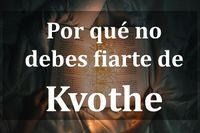
Quien haya leído “Crónica del Asesino de Reyes”, sabe perfectamente que Kvothe es un narrador
Quien haya leído “Crónica del Asesino de Reyes”, sabe perfectamente que Kvothe es un narrador no fiable. ¿Qué quiere decir eso? Que, como persona imperfecta, su narración puede diferir mucho de lo que en realidad ocurrió. Sin embargo, su manera de narrar es tan poética, que muchas veces nos quedamos embelesados admirando lo que nos cuenta.¿Qué esconde Kvothe en su narrador? ¿Por qué puede ser que no nos esté contando toda la verdad? Esta historia tiene varios niveles de realidadRecuerdo la primera vez que leí “El nombre del viento”. No entendí nada durante las primeras páginas. Tenemos un posadero, que parece ser el protagonista, aunque la historia no parece centrarse en él hasta más adelante. Un posadero con varios nombres: Kote, Reshi…Cuando leemos la primera vez nos olvidamos del principio, de que estamos hablando de una persona que ha matado. Vemos una persona rota y abatida, y nos identificamos con sus desgracias. Nos da pena Kvothe y lo vemos como un prodigio: un héroe.

Kvoth (born August 15, 2000) is a Pakistani Age of Mythology player who is currently playing for KeeN.
I was expelled from the University at a younger age than most people are allowed in. I tread paths by moonlight that others fear to speak of during day. I have talked to Gods, loved women, and written songs that make the minstrels weep. You may have heard of me." ―Kote[1] Kvothe (PR: /kvoʊθ/; ...
"I have stolen princesses back from sleeping barrow kings. I burned down the town of Trebon. I have spent the night with Felurian and left with both my sanity and my life. I was expelled from the University at a younger age than most people are allowed in. I tread paths by moonlight that others fear to speak of during day.Kvothe (PR: /kvoʊθ/; RD: /kvəʊθ/)[2] is the main character in the Kingkiller Chronicle. His name is described as much like the word quoth (/kwəʊθ/) but beginning the same as the Yiddish term kvetch (/kvɛtʃ/).Meeting Abenthy was a pivotal moment in Kvothe's life. During his first encounter with the arcanist, he witnesses him call the name of the wind. This ability sparks his interest and ultimately leads him to the University. Abenthy instructs Kvothe in Sympathy, Chemistry, Rhetoric, and Arithmetic, in preparation for his admittance to the University.After Abenthy's departure, Kvothe's education with the troupe is stepped up to keep him busy. Not long later his troupe is brutally murdered by the Chandrian, and Kvothe survives as he was playing in the forest away from the road.
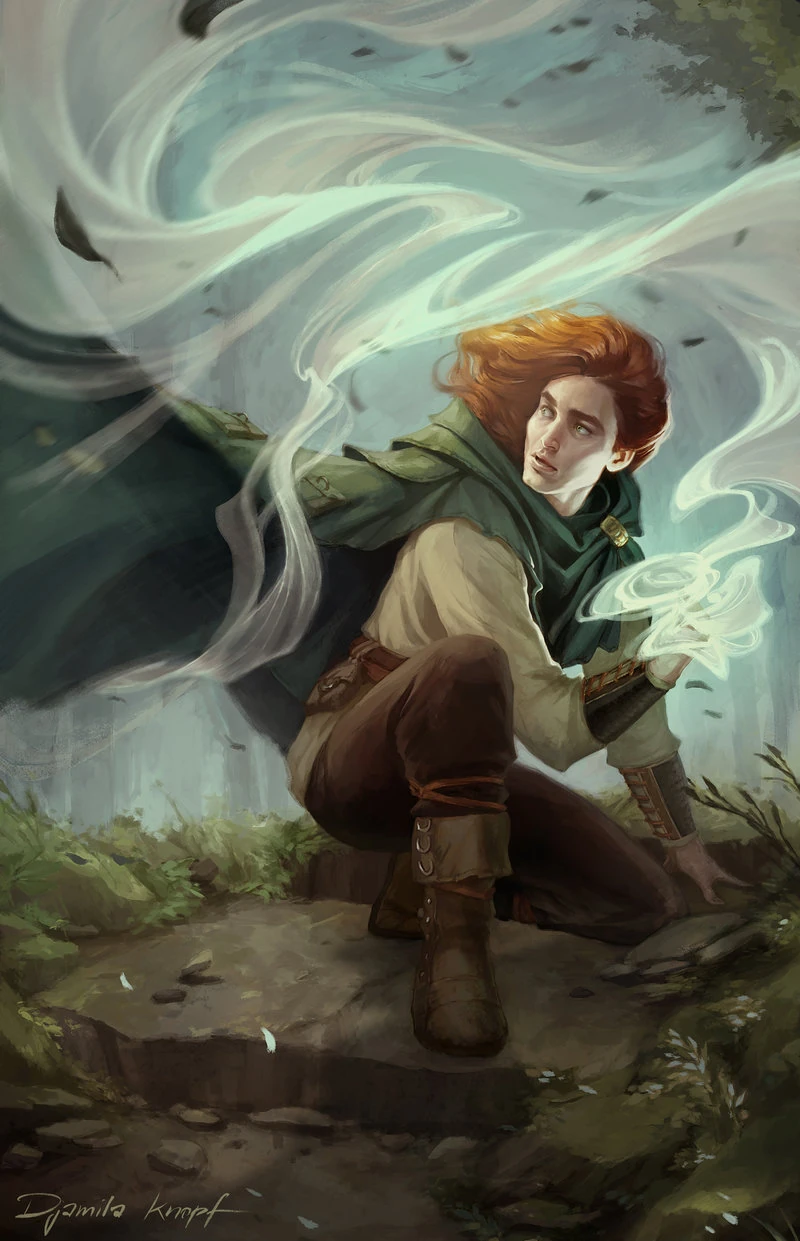
Answer: Umm… no. How would this even be possible? Haliax is thousands of years old. Kvothe is about 18 at the end of Wise Man’s Fear and estimated to be between 22 and 25 when he is at the Waystone inn telling his story. Now… Haliax’s son? That is an interesting theory.







